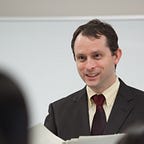An Adult Choice: I’m a Yale Graduate Teacher, and I’m Fasting for my Family
For more than three weeks, members of my union, Local 33-UNITE HERE, have been engaged in a fast protesting Yale University’s refusal to negotiate. I joined them, going four days without food. We’re graduate teachers at Yale, and we voted to unionize months ago. But Yale won’t sit down with us, instead delaying until Donald Trump appoints a new National Labor Relations Board. So the fast — and the surrounding actions — are our way of fighting back.
A funny thing I’ve noticed as the fast has gotten national media attention — particularly from vitriolic conservatives — is that many seem not to really understand what a graduate student is. They think we’re spoiled. They call us snowflakes. Most of all, our opponents seem to think we’re children.
In other words, there’s a stereotype of what graduate students look like: young, healthy, white, male, single, American. In whatever ways you don’t fit this model, you’re likely to find the institution hasn’t thought about you or your needs. A Yale degree is worth a lot, and I’m proud to be at this institution. But for all that it means to me, a Yale degree means less to my children or my wife as we struggle to get by and hold our family together.
I’m in my second year in Yale’s Department of East Asian Languages and Literatures, where I’ve been teaching Japanese to undergraduates. I’ve had a rough go of things at Yale, and it’s exactly because I’m not a kid. Actually, I have kids.
I lived in Japan for many years. There, I got married and had children. My youngest son’s name, as it happens, translates to “Light and Truth” — the same as Yale’s motto, Lux et Veritas. My first son’s name in Japanese means “purity and truth,” and in Greek means “word,” because my wife and I value learning. But we actually chose the name thinking of the words of a faster, who when tempted, said, “Man shall not live on bread alone, but on every word that proceeds from the mouth of God.”
Eventually we moved back to this country so I could go to graduate school. This was a difficult transition for my family, but in ways we didn’t expect. My wife can’t work here, meaning that the four of us have to live on my income from working at academia’s bottom rank. This might be okay if I were young and single — but $29,000 is not much for a family of four to live on.
When I came to Yale, I was told that the university offered support for parents that would make this work. For example, Yale offers family housing. It’s more affordable than equivalent housing in the New Haven market, and it offers cultural programming, which can be especially valuable for families — like mine — that don’t come from this country. So I applied. Then Yale made a series of bureaucratic errors, and I wound up without the spot that I was counting on. I spent the whole next year fighting for another chance at getting into family housing.
This situation meant that we didn’t have a New Haven address to get our kids enrolled in school until months later, which caused more financial trouble for us as we tried to figure out how to get education and care for our kids.
While the housing problem caused tremendous stress and conflict for my family, it could easily have been worse still. For example, Yale only provides spousal health coverage if a couple has children. If we didn’t have kids, I would have had to buy health care for my wife, which would’ve pushed us into dire economic circumstances. And while my wife’s inability to work has meant that we haven’t had to pay for child care, I know lots of couples who do — and find it entirely unaffordable on the wages Yale pays.
It seems unsurprising to me that people have the wrong idea about who graduate students and teachers are, given that Yale itself seems to have the wrong idea about us. The thoughtlessness and lack of professionalism with which the university administration has treated my family and me makes clear that they think we’re kids too.
No wonder they refuse to honor our democratic choice or listen to our voice. Yale’s administration seems to be in denial about the basic realities of our lives and our needs. But the act of an indefinite fast seems to me to contradict this attitude. It’s an act of profound discipline, taken on by adults who know their values and are acting on them. I hope Yale learns something, and lives up to its own principles.
Over the past year, I have learned greater patience. Waiting for housing. Waiting for available seats for my children in the public school system. Waiting to get paid for my work. For months since our election, we have been waiting to negotiate. I am not asking for any personal luxuries. I just care about my family’s health, and if President Salovey is concerned too, I invite him to sit down at the table with us immediately and work out a plan that will ensure the health of all graduate teachers, even those who come from non-traditional trajectories.
In the meantime, we’re making a more family-friendly Yale ourselves. The other day, a group of graduate teacher parents brought our children to Beinecke Plaza. They played, they drew with chalk on the plaza, and they knocked on the Yale president’s door to make sure he knew about them. I still believe in the possibility of a Yale that recognizes us for who we are — parents, adults, professionals, and union members.
